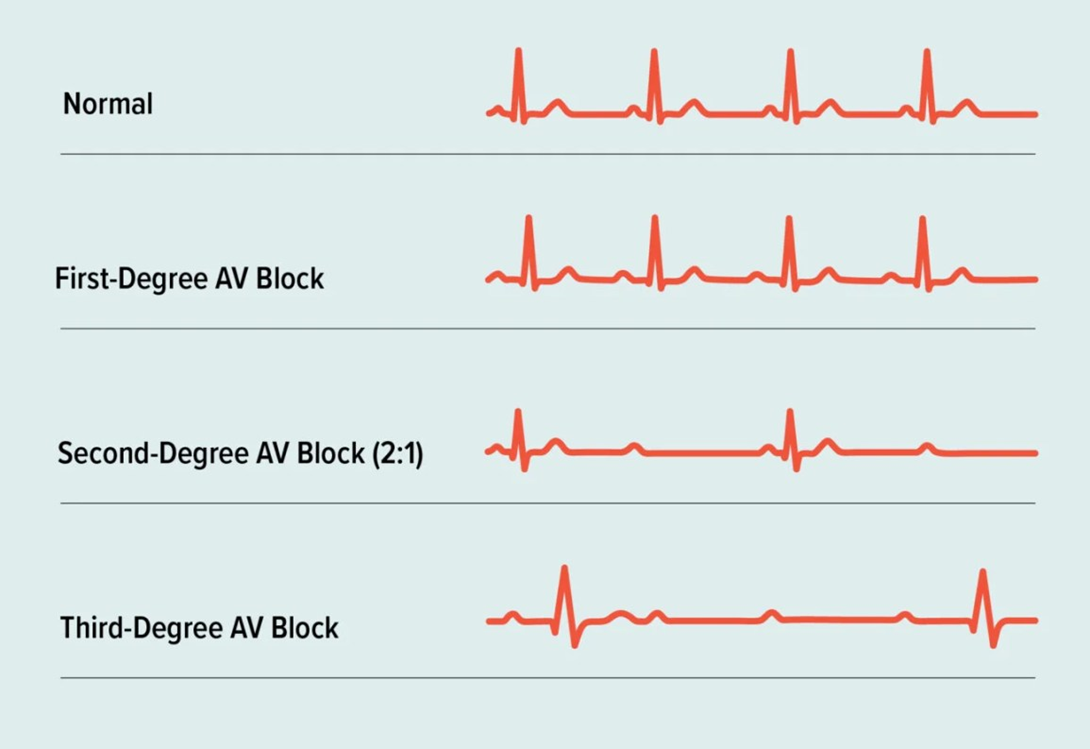A nurse is caring for a client who has been prescribed parenteral lidocaine. Before administering the medication, the nurse should review the medical record for which condition?
Glaucoma.
Heart block.
Gastric ulcers.
Diabetes mellitus.
The Correct Answer is B
Choice A reason: Glaucoma is not directly related to the administration of lidocaine, as it does not affect intraocular pressure or the pathophysiology of glaucoma.
Choice B reason: Heart block is a type of arrhythmia where the electrical signal is delayed or blocked entirely. Since lidocaine affects cardiac conduction, it is crucial to review the medical record for heart block before administration.
Choice C reason: Gastric ulcers are not typically a concern when administering lidocaine, as it does not have gastrointestinal effects when given parenterally.
Choice D reason: Diabetes mellitus is not a contraindication for lidocaine administration; however, monitoring blood glucose levels is always important in diabetic patients receiving any medication.

Nursing Test Bank
Naxlex Comprehensive Predictor Exams
Related Questions
Correct Answer is B
Explanation
Choice A reason: Glaucoma is not directly related to the administration of lidocaine, as it does not affect intraocular pressure or the pathophysiology of glaucoma.
Choice B reason: Heart block is a type of arrhythmia where the electrical signal is delayed or blocked entirely. Since lidocaine affects cardiac conduction, it is crucial to review the medical record for heart block before administration.
Choice C reason: Gastric ulcers are not typically a concern when administering lidocaine, as it does not have gastrointestinal effects when given parenterally.
Choice D reason: Diabetes mellitus is not a contraindication for lidocaine administration; however, monitoring blood glucose levels is always important in diabetic patients receiving any medication.

Correct Answer is {"dropdown-group-1":"A","dropdown-group-2":"B"}
Explanation
Choice A Reason: Decreasing portion sizes can help manage calorie intake and contribute to weight loss, which is beneficial for individuals with prediabetes or diabetes. Proper portion control is also essential for maintaining blood sugar levels within the target range.
Choice B Reason: Avoiding potassium-rich foods is not a standard dietary recommendation for diabetes management unless the individual has a specific condition like kidney disease that requires potassium restriction.
Choice C Reason: Eating only plant-based foods is not necessary for diabetes management. While a plant-based diet can be part of a healthy eating plan, it is not required for all individuals with diabetes.
Choice D Reason: Choosing a well-rounded diet ensures that all necessary nutrients are included, which is important for overall health and can help manage blood sugar levels. A balanced diet for diabetes should include a variety of foods from all food groups.
Choice E Reason: Eliminating carbohydrates is not recommended for diabetes management. Carbohydrates are a necessary part of a healthy diet, and individuals with diabetes should focus on the type and amount of carbohydrates consumed rather than eliminating them entirely.
Choice F Reason: Replacing refined sugar with honey or molasses is not necessarily beneficial for diabetes management. While these are natural sweeteners, they still affect blood sugar levels and should be used in moderation.
Whether you are a student looking to ace your exams or a practicing nurse seeking to enhance your expertise , our nursing education contents will empower you with the confidence and competence to make a difference in the lives of patients and become a respected leader in the healthcare field.
Visit Naxlex, invest in your future and unlock endless possibilities with our unparalleled nursing education contents today
Report Wrong Answer on the Current Question
Do you disagree with the answer? If yes, what is your expected answer? Explain.
Kindly be descriptive with the issue you are facing.
